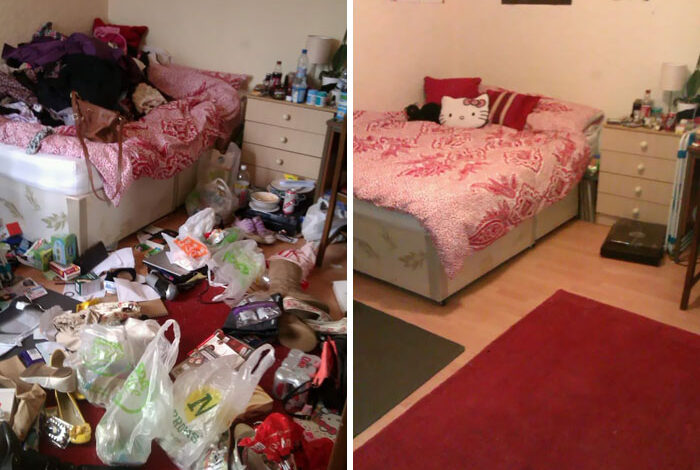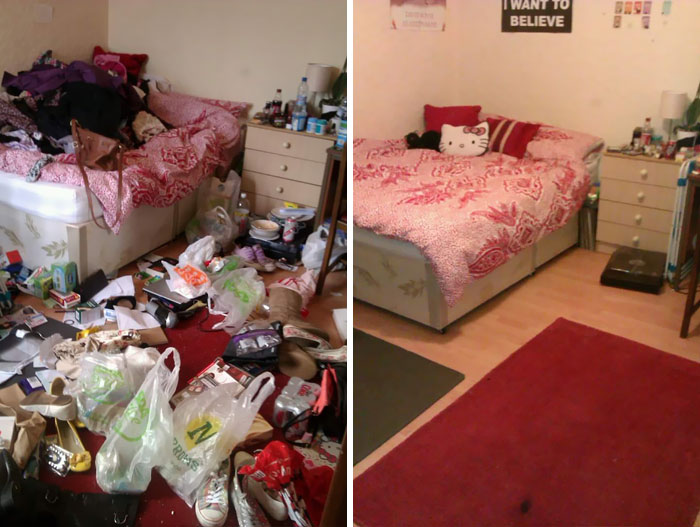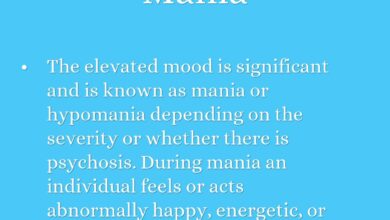
Depression and a clean home might seem like disparate concepts, but they’re surprisingly intertwined. A cluttered space can amplify feelings of overwhelm and hopelessness, while a clean, organized home can foster a sense of calm and control. This exploration delves into the powerful link between mental well-being and our living environment, offering practical steps to create a supportive home for those navigating depression.
We’ll examine the psychological impact of a messy versus a tidy home, providing practical strategies for maintaining a clean space while managing depression. We’ll explore how organization can reduce stress and anxiety, and demonstrate how a clean home can positively affect daily routines and overall well-being. Visual examples will further illustrate the difference a clean home can make.
The Connection Between Mental Health and Home Environment: Depression And A Clean Home

Our homes are more than just physical structures; they are extensions of ourselves, reflecting our values, routines, and, crucially, our mental well-being. The environment we create directly impacts our emotional state, and this influence is particularly significant for individuals experiencing mental health challenges. A cluttered or disorganized space can exacerbate feelings of anxiety and depression, while a clean, organized home can foster a sense of calm and control.
This connection underscores the importance of creating a supportive and nurturing living space for optimal mental health.A well-organized home environment, where everything has its place, can significantly reduce stress and promote a sense of calm. This is because a clutter-free space allows for a clearer mind, and minimizes the sensory overload that can trigger anxiety or feelings of overwhelm.
Conversely, a cluttered space can feel chaotic and overwhelming, leading to increased feelings of stress, anxiety, and even depression. This isn’t simply about aesthetics; it’s about the profound impact a well-organized space has on our mental health.
The Impact of Clutter on Mood
A cluttered home can act as a visual representation of mental clutter. The constant presence of untidiness can be a constant reminder of tasks that need to be done, or things that need to be addressed, thereby increasing feelings of stress and inadequacy. This sensory overload can contribute to a negative mood and feelings of anxiety, making it harder to focus and relax.
For example, a person struggling with depression might find it difficult to even start cleaning, compounding the feelings of being overwhelmed.
Examples of a Clean Space Fostering Well-being
A clean, organized home can be a powerful tool in promoting a sense of well-being. A neatly arranged bedroom, for example, can contribute to a sense of calm and tranquility before sleep. A kitchen free of clutter makes meal preparation more enjoyable and efficient, removing a source of stress. A clear, well-lit living room creates a relaxing atmosphere that encourages social interaction and fosters a sense of comfort and belonging.
These small improvements can significantly enhance a person’s overall mood and reduce feelings of stress and anxiety.
Challenges in Maintaining a Clean Home During Depression
Maintaining a clean home can be a significant challenge for individuals experiencing depression. Several psychological factors contribute to this difficulty. A lack of motivation is a common symptom of depression, which can hinder the ability to initiate cleaning tasks. Feelings of hopelessness and worthlessness can make it seem like a futile effort. Furthermore, fatigue and low energy levels associated with depression make even simple tasks seem insurmountable.
The act of cleaning might be perceived as an additional burden and avoided as a result. For example, a person experiencing depressive symptoms might struggle to find the energy to clean, leading to a progressively more cluttered home. This, in turn, can create a vicious cycle, further diminishing self-esteem and exacerbating depressive symptoms.
Messy vs. Tidy Home Environments
The emotional impact of a messy versus a tidy home environment is stark. A tidy home often promotes a sense of control and accomplishment, fostering feelings of calm and self-worth. Conversely, a messy home can contribute to feelings of helplessness, stress, and inadequacy. The difference lies in the perception of control and order, and how these factors affect the person’s mental state.
In a tidy environment, a person feels capable of managing their surroundings, which can positively impact their overall well-being. A messy home can symbolize a sense of loss of control and overwhelm, making it challenging to feel calm and positive. For example, a person who struggles with depression might find their living space reflecting this struggle, which can exacerbate the negative feelings.
Practical Steps for Maintaining a Clean Home with Depression
Maintaining a clean home can be a significant challenge when dealing with depression. The feeling of overwhelm often prevents us from even starting, and the tasks themselves can feel insurmountable. This makes creating a sustainable cleaning routine crucial for both physical and mental well-being. However, the key is to approach cleaning with compassion and understanding, tailoring the process to fit your individual needs and energy levels.A clean home isn’t about perfection; it’s about creating a space that promotes a sense of calm and control.
This approach focuses on manageable steps, realistic expectations, and incorporating elements of enjoyment. This will empower you to establish a routine that supports your mental health and fosters a healthier home environment.
Establishing a Manageable Cleaning Routine
Creating a cleaning routine is not about adopting a rigid schedule, but about developing a system that works for you. Start by identifying your strengths and weaknesses, recognizing the tasks you enjoy and those you find more challenging. For example, if you enjoy organizing, focus on that first. Conversely, if you find cleaning the bathroom overwhelming, break it down into smaller, more achievable tasks.
It is essential to recognize that consistency is more important than perfection.
Daily or Weekly Checklist
A simple checklist helps to break down large tasks into smaller, more approachable steps. This minimizes the sense of overwhelm and promotes a feeling of accomplishment.
- Morning: Make your bed, tidy up the living room, and load the dishwasher.
- Afternoon: Wipe down counters, clean one area of a specific room, like a desk or a table.
- Evening: Put away items you use, unload the dishwasher, and take out the trash.
- Weekly: Empty and clean the trash cans, vacuum or sweep one room, and wipe down bathroom surfaces.
This flexible checklist allows for adjustments based on your energy levels and priorities. Don’t feel pressured to complete everything every day. The key is to consistently do something, even if it’s just a small step.
Breaking Down Large Cleaning Projects
Large cleaning projects, such as deep cleaning a room or organizing a closet, can seem daunting. Breaking these projects into smaller, more manageable steps is key.
- Identify the project: For instance, “deep clean the bedroom.”
- Divide into smaller tasks: “Empty the dresser drawers,” “Dust and vacuum the floor,” “Wipe down surfaces.”
- Prioritize tasks: “Empty the dresser drawers” might be a good starting point because it’s less time-consuming.
- Set a realistic timeframe: One afternoon, or perhaps one weekend.
- Reward yourself: A small treat after completing a step or the entire project can reinforce positive behavior.
Breaking down complex tasks into smaller steps significantly reduces feelings of anxiety and overwhelm.
Prioritizing Tasks and Avoiding Overwhelm
Prioritizing tasks helps focus your efforts on the most important or easiest tasks first.
- Identify tasks that create the most immediate impact: This could be tidying a particular area or washing dishes. Small victories build momentum.
- Focus on one task at a time: Avoid trying to tackle multiple tasks simultaneously. This prevents mental overload and improves focus.
- Use a timer: Working in focused intervals, such as 15-20 minutes, can prevent burnout and help stay motivated.
- Accept that some tasks might take longer: If a task is taking longer than anticipated, it’s okay to adjust the timeframe or break it down further.
This approach reduces the feeling of being overwhelmed and helps you maintain a sense of accomplishment.
A clean home can surprisingly be a mood booster for someone struggling with depression. It’s amazing how a tidy space can actually ease feelings of overwhelm, right? However, while we’re on the topic of breakthroughs, did you know that doctors are exploring using the herpes virus to fight brain cancer? It’s fascinating how science is constantly finding new ways to tackle challenging diseases, and the research into doctors using herpes virus to fight brain cancer is a testament to that.
Ultimately, maintaining a clean and organized living space can significantly impact mental well-being, fostering a sense of calm and control during challenging times.
Realistic Expectations
Maintaining a clean home while managing depression requires understanding your limitations.
“Set realistic goals. Don’t aim for perfection. A clean home doesn’t define you or your mental well-being.”
Maintaining a consistent, even if small, cleaning routine, is more beneficial than trying to achieve an impossible standard of cleanliness. Recognize that progress, not perfection, is the key. Don’t compare yourself to others; focus on your personal progress.
A clean home can sometimes feel like a small victory when battling depression. It’s a tangible, achievable goal, and seeing the results can boost your mood. However, the path to true well-being, including exploring if depression remission is even possible, often requires more than just tidying up. Finding out more about the potential for remission can be a powerful step in understanding the journey towards recovery.
A clean space can be a great starting point, but a comprehensive approach, like those discussed in articles exploring is depression remission possible , is often necessary for lasting improvement and a more fulfilling life.
Incorporating Enjoyable Elements
Incorporating enjoyable elements can make cleaning more manageable and less tedious.
- Put on music: Upbeat music can energize you and make the task more enjoyable.
- Use a playlist specifically for cleaning: This can create a sense of routine and anticipation.
- Reward yourself: A small treat or a short break after completing a task can increase motivation.
- Listen to a podcast or audiobook: This can make the task more engaging and rewarding.
Making cleaning enjoyable can reduce feelings of stress and resistance to the task.
The Role of Organization in Managing Depression
A clean and organized home environment can significantly impact mental well-being, particularly for individuals struggling with depression. A sense of order and control over one’s surroundings can foster a feeling of accomplishment and reduce feelings of overwhelm, which are common symptoms of depression. This sense of accomplishment, no matter how small, can contribute to a positive feedback loop, boosting self-esteem and motivation.Organization goes beyond aesthetics; it’s a practical tool for managing stress and anxiety.
A cluttered space can often feel overwhelming, leading to increased feelings of stress and anxiety. A well-organized space, on the other hand, can provide a sense of calm and control, reducing the feeling of being overwhelmed by daily tasks and responsibilities. This sense of control is crucial for individuals navigating depression, as it can help them feel more in charge of their lives.
The Link Between Organization and Reduced Anxiety
A well-organized home environment can directly contribute to a reduction in anxiety and stress. Studies have shown a correlation between a cluttered living space and heightened levels of stress hormones. A tidy and organized space, conversely, often promotes a sense of calm and control, allowing individuals to focus on other aspects of their lives without the constant visual reminders of chaos.
Strategies for Decluttering and Organizing
Decluttering and organizing can seem daunting, especially when struggling with depression. It’s crucial to approach these tasks in manageable steps. Start with one small area, such as a drawer or a shelf, and focus on removing items you no longer need or use. Consider the concept of “one in, one out” to help manage the influx of new items.
This approach encourages mindful consumption and helps prevent the space from becoming cluttered again.
- Tackling Specific Areas: Begin with a small, manageable area, like a drawer or a countertop. Focus on sorting items into three piles: keep, donate, and discard. This targeted approach is less overwhelming than trying to tackle the entire house at once.
- Mindful Consumption: Before purchasing new items, consider whether you truly need them. Ask yourself if the item will add value to your life and if you have the space for it. The “one in, one out” rule can be a helpful tool to maintain a manageable amount of possessions.
- Creating Zones: Designate specific areas for different activities or items. This creates a sense of order and helps you find things more easily. For example, a dedicated workspace can help reduce distractions and increase productivity.
Organizational Tools and Resources
A variety of organizational tools and resources can aid in maintaining a well-organized home. These tools can range from simple storage solutions to more complex organizational systems.
- Storage Solutions: Utilizing storage containers, bins, and shelves can help keep items organized and out of sight. Labeling containers can further enhance organization and aid in locating items quickly.
- Digital Organization: Digital tools, such as apps and software, can be invaluable for managing tasks, schedules, and to-do lists. This can help alleviate the mental load of managing daily tasks, reducing stress and improving productivity.
- Professional Organizers: Professional organizers can provide valuable guidance and support in developing and implementing personalized organizational systems. They can help you identify areas of clutter and provide practical solutions tailored to your specific needs.
Comparing Organizational Systems
Different organizational systems offer various benefits and drawbacks. The best system is often the one that best suits an individual’s needs and preferences.
- The KonMari Method: This method emphasizes keeping only items that “spark joy,” discarding the rest. It can be particularly effective for decluttering and creating a more minimalist space.
- The Marie Kondo Method: This system focuses on keeping only items that bring you joy and discarding those that do not. It encourages mindful consumption and a more intentional approach to organizing.
- The “Declutter Your Mind” Method: This method focuses on decluttering physical spaces while also tackling mental clutter and emotional burdens. It can be a holistic approach that helps individuals feel more organized in all aspects of their lives.
The Impact of a Clean Home on Daily Functioning
A clean home isn’t just about aesthetics; it significantly impacts our daily lives, particularly for individuals experiencing mental health challenges. A well-organized and tidy space can foster a sense of calm, reduce stress, and improve overall functioning. This positive impact extends to various aspects of daily life, from sleep quality to meal preparation and mood.A clean home acts as a foundation for better daily routines.
It provides a predictable and stable environment, which can be crucial for those managing depression. When the physical space is organized, it can translate into a sense of control and order, which can then positively influence other areas of life. This sense of control can be especially beneficial for individuals struggling with the overwhelming nature of depression, enabling them to better manage their day-to-day activities.
Positive Effects on Daily Routines and Activities
A clean home creates a conducive environment for engaging in daily tasks. A clutter-free space reduces distractions and promotes focus. This, in turn, can lead to a smoother flow of daily activities, from getting dressed to completing work or chores. The reduction in distractions can be especially helpful for those struggling with concentration or motivation, allowing them to accomplish more.
Connection Between a Clean Space and Improved Sleep Quality, Depression and a clean home
A tidy bedroom environment directly impacts sleep quality. A clean and organized bedroom promotes relaxation and reduces feelings of anxiety or stress. This creates a more conducive atmosphere for sleep, allowing for a more restful night’s sleep. A clean bedroom can also contribute to a sense of security and comfort, which are crucial elements in promoting good sleep.
Contribution of a Tidy Home to Peace and Reduced Overwhelm
A clean home fosters a sense of peace and calm. The absence of clutter and mess creates a more serene atmosphere. This can significantly reduce feelings of overwhelm, particularly helpful for those experiencing depression, allowing them to feel less burdened by their surroundings. A tidy home promotes a sense of control and order, which can be a powerful antidote to the overwhelming feelings often associated with depression.
Impact on Meal Preparation and Healthy Eating Habits
A clean kitchen facilitates healthy eating habits. When the kitchen is organized and accessible, preparing meals becomes easier and more enjoyable. This can lead to more balanced meals and a healthier lifestyle. A clutter-free kitchen also makes it easier to see what ingredients are available, reducing impulse purchases and promoting mindful eating.
A clean home can surprisingly lift your spirits, even when battling depression. It’s amazing how a tidy space can impact your mental well-being. This is definitely something to consider as a possible coping mechanism. Recent diet trends, like the keto diet ranking lower than the DASH diet on a new list of popular choices, keto ranked low dash ranked high on new diet list , might indicate a shift in focus towards healthier eating habits, which can also positively influence overall mood.
Ultimately, finding small ways to improve your environment, like keeping a clean home, can be a powerful tool in managing depression.
Influence on Mood and Reduction of Feelings of Isolation
A clean space can have a remarkable impact on mood. A well-maintained home can boost feelings of self-worth and confidence. This can counter the feelings of isolation and hopelessness that can accompany depression. The sense of accomplishment associated with maintaining a clean home can be a significant source of pride and a powerful tool in managing depressive symptoms.
The positive feedback loop of a clean home can contribute to a more positive mood and reduce feelings of isolation by providing a more inviting and comfortable environment.
Visual Representations of Clean and Messy Homes

A clean home isn’t just about tidiness; it’s a reflection of our mental state and a crucial element in managing depression. Visual cues, both in the physical layout and atmosphere, can significantly impact our emotional well-being. Understanding the contrast between a clean and messy home allows us to connect the tangible with the intangible, linking the environment to our mental health.
Clean vs. Cluttered Home Visual Comparison
This table illustrates the stark visual difference between a clean and a cluttered home environment. Visual cues are a powerful form of communication, impacting our mood and our sense of control.
| Description | Clean Home | Cluttered Home |
|---|---|---|
| Visual Appearance | Organized, spacious, clear sightlines, visually appealing. | Disorganized, cramped, cluttered, visually overwhelming, lack of clear sightlines. |
| Space Perception | Large, airy, and inviting. | Small, confined, and potentially claustrophobic. |
| Mood evoked | Calm, peaceful, and potentially empowering. | Anxious, stressed, and potentially overwhelming. |
| Example | A bedroom with neatly folded clothes, a tidy desk, and soft lighting. | A bedroom with clothes strewn across the floor, a cluttered desk, and harsh overhead lighting. |
Maintaining a Clean Home by Space
Maintaining a clean home involves consistent effort across different areas. A systematic approach, tailored to each space, is key to long-term success.
| Space | Maintaining Cleanliness | Atmosphere |
|---|---|---|
| Kitchen | Regular cleaning of countertops, sinks, and appliances. Proper food storage to avoid spills and pests. Clear the counter of clutter. | Clean and organized kitchens promote a feeling of calm and control. A well-maintained kitchen allows for focused cooking and meal preparation. |
| Bathroom | Daily cleaning of sinks, toilets, and showers. Proper storage of toiletries and cleaning supplies. | A clean bathroom promotes hygiene and a sense of relaxation. A clean bathroom space fosters a sense of calm and preparedness. |
| Bedroom | Regular making of the bed. Tidying up clothes and personal items. Maintaining a designated space for work or study. | A clean bedroom promotes a sense of tranquility and rest. A well-organized bedroom allows for a restful sleep and promotes a sense of peace. |
| Living Room | Regular vacuuming and dusting. Keeping surfaces clear of clutter. | A clean living room creates a relaxing atmosphere for social interaction. A clean and organized living room creates a welcoming environment. |
Visual Impact on Mood and Well-being
This table Artikels the correlation between a clean home and improved mood and well-being. A clean environment is a crucial component of managing depression.
| Visual Cues | Impact on Mood | Impact on Well-being |
|---|---|---|
| Tidy and Organized Spaces | A sense of calm and control. | Increased feelings of accomplishment and reduced stress. |
| Clear Sightlines | Reduced feelings of overwhelm and anxiety. | Increased focus and attention. |
| Minimal Clutter | A sense of spaciousness and openness. | Increased feelings of peace and tranquility. |
| Example | A meticulously organized kitchen promotes a sense of control over meal preparation. | A clutter-free bedroom encourages a sense of rest and relaxation, promoting better sleep. |
Ultimate Conclusion
In conclusion, a clean home doesn’t magically cure depression, but it can be a powerful tool in the journey toward improved mental well-being. By understanding the connection between our living space and our emotional state, and by implementing practical strategies for organization and maintenance, we can create a more supportive and nurturing environment. This, in turn, can contribute to a greater sense of control, calm, and overall well-being for those facing challenges with depression.





